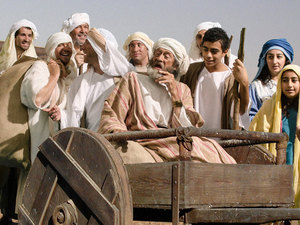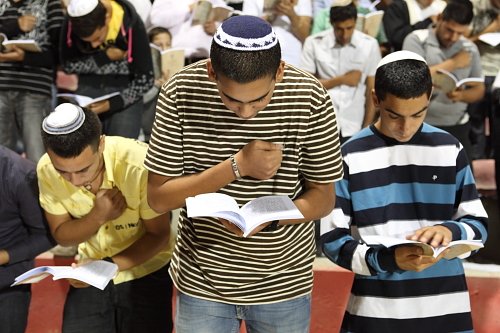The Facebook post started with a simple question:
Has anyone ever heard of a pregnant or nursing woman only fasting until Chatzos if Tisha B'av is a nidcheh? I remember someone once telling me this and I'm trying to find a source for it...
The post clearly touched a nerve with the Facebook friends who began to suggest answers to the question.
- There are definitely kulahs with a nidcheh fast. Ask your LOR (Local Orthodox Rabbi). Will probably depend on the specific situation.
- Ask your rabbi...I've heard a few different things.
Then, the poster responded with a semi-joking comment:
I'm trying to send my LOR in the right direction :-)
This was followed by a series of comments and suggestions, including piskei halachah by no less than two rabbis, both of whom offered different opinions. One said, "A choleh should fast until morning. There's nothing special about chatzos for fasting." In other words, she must begin the fast, but can break it by morning. Another wrote that, "On a tisha bav nidche pregnant women who experience even mild discomfort, break their fast . see biur halacha 559:9 s.v. vaino . nursing women are in the same category this means whenever you feel worse than normal fast even a headache alone is enough to eat you eat normally no shiurim." In other words, you must fast normally, until and unless you feel discomfort, at which point you can break your fast.
In the course of the thread, other posters shared the rulings of
Rav Avigdor Neventzal (who rules that pregnant or nursing women need not fast at all) and
Rav Yaakov Ariel (who ruled that they must begin the fast and can break it if they feel discomfort).
The entire thread and ensuing discussion raises for me the thorny issue of
psak halachah in the age of the Internet. What is
psak halachah, and can there even be such a thing, when every possible question has already been asked (and answered), and is readily available to anyone who knows how to search for it - and often those answers conflict?
Clearly, this "open information" has already affected the way that we ask our questions. The thread I mentioned above is a case in point: instead of asking her rabbi, the poster asked a "shaila" of the "crowd". Moreover, it's not really a question per se, but a search for a specific answer that she's heard of. If she wanted a "clean" answer, she could have texted her rabbi, "Hi! As you know, we just had a baby. Do I need to fast this year on Tisha B'av?" But that wasn't her question. As she herself admits, she doesn't want a clean answer. She wants the "right" answer: "I'm trying to send my LOR in the right direction."
Then, as I noted above, the post developed into a discussion about actual psak, pitting two sets of rabbis (LORs and Gedolim) against one-another, leaving our harried poster both confused and frustrated. She wanted a clear answer, not a "see how you feel". After all, who doesn't feel hungry and thirsty and in discomfort on a fast day? (She's totally right about that point.) Yet, her desire for a straight, clean answer of yes or no is directly in conflict with her posing of the question originally. Does she really want a "yes or no", or is just a "no, you don't have to fast" the answer that will satisfy her?
I wonder how these types of questions are now affecting rabbis and the pressure they feel to issue more lenient piskei halachah. Imagine that I receive this question from a congregant, and I feel that halachah requires women to fast (unless they feel "discomfort"). Yet, I know that the person asking the question has already looked up this issue on the Internet. And if she hasn't, she will then turn to Facebook to express her frustration that she has to fast on Tisha B'av. I can just see the post now.
Poster: Ugh! I hate fasting on Tisha B'av, especially when I'm nursing!
Friend 1: What? Why are you fasting? My rabbi (who lives in another part of the world) told me that I don't have to fast.
Friend 2: I never fasted for two years after I gave birth. Sefardim rule!
Friend 3: Rabbi Such and Such posted three years ago that if you're thirsty, you can break your fast...
It's not that difficult to imagine. It happens all the time.
The next time this woman has a question, will she turn to her LOR? Or, will she turn to the rabbi across the country, or just to the "hive" to figure out what psak makes the most sense to her. The rabbi knows all of this. He knows both positions. To what degree does this knowledge affect the answer that he gives her?
I find the whole thread fascinating in that it raises important questions about psak and poskim in an Internet age where everything is available on the Internet. How can there be psak when we all have five rabbinic "friends" who give different answers? What does it even mean to ask a question?
The answers to these questions might very well be determined by no less than our relationship to halachah. The answer to all of these questions will ultimately depend on the degree to which we can return to the famous concept in Pirkei Avot called, "
Aseh lecha rav" - make for yourself a rabbi. Halachah is uniquely personal. It can be both rigid but also flexible when necessary. But we, as a community, seem to have fallen into such a robotic adherence to ritual, without its attendant deeper meaning, that we're always looking for the easiest way to fulfill our obligation and be done with it. To do that, all you need is information. You don't really need a rabbi. You need a website, and today there are plenty of those. Then its simply a race to the bottom, to find the most lenient "accepted" rabbi, and before you know it, the most lenient position becomes normative.
The job of a rabbi isn't just to be a website. I've never really liked SMS questions (which are all the rage in Israel - still!) because they rid the halachic process of any relationship between the petitioner and the rabbi. The job of the rabbi isn't just to issue black and white rulings. It's to transmit not only the ruling in a manner that's most meaningful and relevant to the person asking the question.
The entire discussion about fasting revolved around purely technical issues - must a nursing woman fast on Tisha B'av or not? Of course there are technical halachic issues at play, but nowhere in the thread did anyone raise the issue of why: Why should she fast? Why should she not? No one "wants" to fast on fast day. Today we wish each other an "easy fast". "Hope it's not too hard!" Does that really make sense? Isn't the idea of fasting supposed to be hard? In essence, wishing someone an easy fast is saying, "I know we're all fasting because we have to; But I hope the day goes by quickly, with as little discomfort as possible." Clearly people don't mean it this way, but that's what it boils down to. If you're going to do it, hopefully the bitter pill goes down easy.
Nowhere in the discussion of whether this woman must or must-not fast was the issue of meaning. Chazal felt that our actions influence our attitudes, nowhere more than on days of mourning, like Tisha B'av. Nowhere in the discussion, did the personal needs of the individual arise. What if, instead of asking Facebook, the person asking the question called her rabbi with the very same question, and got this answer:
R: Well, how do you fast? (That's a really important question in this discussion, which never really came up.)
Cong: Well, I get pretty thirsty - but not really different than most mornings. It's a fast day after all.
R: Do you get bad headaches? Does fasting make it challenging for you to function?
Cong: Not usually, but I'm worried about having to fast and take care of my baby.
R: Can your husband come home and help out, instead of spending all morning in shul? If we can find a way to handle the childcare together, could you fast in a meaningful way?
Thus, the same rabbi might very well give two different answers to two different women, depending on each one's personal situation.
Rabbis would love to answer questions in this way, but they also need to feel secure in knowing that their congregants aren't shailah-shopping.
Aseh lecha Rav means asking a rav a question with the confidence that the rav will give me the best answer for me, regardless of what he answered someone else (or what someone else answered on the Internet). It means asking an open, honest question, without a predetermined answer. It doesn't mean that you can't push back - that's definitely part of the conversation. But it does imply the trust that when I ask my rabbi my question, I trust that he will, to the best of his ability, give the answer that he feels best applies to me, in my current situation.
In the end, it's all about trust. And trust in rabbis in general isn't a popular topic nowadays. I guess we all have a lot to fast for this coming Tisha B'av.
 Did you know that this shiur is available as a free podcast on iTunes? Click here to subscribe - and leave a comment and rating so more people will find the shiur! Thanks!
Did you know that this shiur is available as a free podcast on iTunes? Click here to subscribe - and leave a comment and rating so more people will find the shiur! Thanks!






























